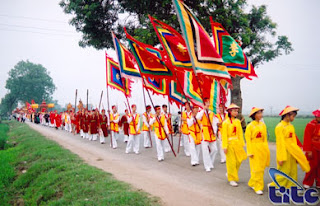The festival takes place from the 14th to the 16th days of the third lunar month. Legend has it that the 15th day of the third lunar month was the coronation of King Ly Cong Uan. Later generations chose the day as a common festival to pay homage to kings of the Ly Dynasty. According to customs in Dinh Bang Village, a chief officiant appointed to administer the festival. The person then presents himself to the genie in a set of solemn rituals and votive offerings including a drum, a platter of betel, and a small bottle of wine. Residential groups, mass organizations and local authorities administer the festival. Pieces of work are assigned according to ages and kinds of person. On festival days, they have to fulfill their assigned tasks. On the 14th, preparatory work finishes. Those appointed for such posts as the King's bodyguards (the tuong), flag holders or palanquin carriers have prepared their costumes and equipment. Others have to clean the road, pagoda and temple. The palanquin procession takes place on the afternoon of the 14th day, starting from Do Temple to Dan Pagoda, where prayers will be read. This ritual aims to take kings Ly to the place where the founder of the dynasty was born and grew up and pay gratitude to those who brought him up and gods and Buddhist spirits at the pagoda. After that, the king’s mother is taken to the temple for the coronation. On the early morning of the 15th day, the procession returns from Dan Pagoda. By then, it is accompanied by another palanquin and altar representing the king’s mother. On the way, the procession drops at Dinh Bang Communal House. The festival manager enters the house to do presentation rituals in front of the village’s tutelary god. After that the procession continues on its way back to the temple. When the procession arrives at the temple yard, dragon-dancing starts, followed by senh tien castanets dancing. Next, three men in the role of the king’s bodyguards, enter the dragon yard. The two palanquins are placed alongside the yard: the one carrying the king’s mother on the right and the other carrying the king on the left. The chief officiant steps into the main sanctuary and reads King Ly Thai To’s edict on the movement of the capital to Thang Long. After that, he puts the document on the main altar. Then he starts the incense offering and festival inauguration rituals. Others follow him to do the incense offering. On each of the 15th and 16th, there is a ceremony solemnly held with votive offerings. There are a lot of fun games during the festival: cock fighting, chess playing, and cheo and tuong performances. Fun activities take place in the temple yard, pond, and other places in the region, attracting a lot of visitors from elsewhere.
Showing posts with label Bac Ninh festival. Show all posts
Showing posts with label Bac Ninh festival. Show all posts
Tuesday, March 29, 2011
Do Temple Festival, Bac Ninh
Monday, February 21, 2011
Festival in February - Lim Festival
LIM FESTIVAL
The Lim Festival, organized in Lim village located 18 km from Hanoi, where Quan Ho, the special folk songs performed. It takes place every year on 13th day of the 1st lunar month. Tens of thousands of visitors come here to enjoy the dialogues performances between "lien anh" (male singers) and "lien chi" (female singers), the country's most skilled Quan Ho singers. These are male and female farmers who sing different types of songs in the pagodas, on the hills, and in the boats. Besides this, visitors can come to the Lim Festival to enjoy the weaving competition of the Noi Due girls. They weave and sing Quan Ho songs at the same time. Like other religious festivals, the Lim Festival goes through all the ritual stages, from the procession to the worshipping ceremony, and includes other activities.
The Lim Festival is a special cultural activity in the North. The festival celebrates the "Quan Ho" folk song which has become a part of the national culture and a typical folk song that is well loved in the Red River Delta region.
The Lim Festival is also celebrated with traditional temple games. In one game, teenage girls must mind a stranger's baby, chew pieces of sugar cane in order to create fuel with which to start and maintain a fire, cook rice, and prevent a frog from jumping out of a circle marked on the ground. If the baby cries, the fire goes out or the frog escapes, the girl is disqualified.
Starting Dates in Western Calendar 15 Feb 2011, 4 Feb 2012
Subscribe to:
Posts (Atom)

